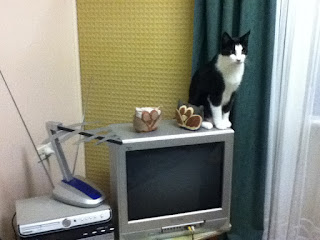I've heard that from a few quarters. I've heard a few different reasons for behind the lack of festive feelings, too:
- It's not the same without small children
- We've all been so busy, it's just kind of snuck up on us
- It's become such a bother - so much to *do* and not really much fun...
The last time I felt really Christmassy was a few years ago when I decided to make all of the decorations myself, out of paper. It was back when my grandmother was still at home, and my mother and I were living with her to take care of her.
I don't know why I came up with the idea, I just felt I needed to actively do something for Christmas. That, and all of the traditions we used to have when our family was bigger than four people (the youngest of which being 29 or 30) had pretty much atrophied and died.
We no longer "all got together" for Christmas - we were "all together" more or less full time. My uncle was the only one who had to come over - and he came over three or four days a week, anyway.
We used to get dressed up and go out for Christmas lunch, and then come back to my grandmother's house for Christmas dinner. Now, we just ate lunch at home, stayed there and ate the exact same food for dinner (and then ate it again the next day, because we don't eat much, but we still have enough food to feed a family of ten).
My grandmother used to make Christmas themed food for most of December - shortbread, fruitcake, that sort of thing. She wasn't up to cooking any more, and my mother and I were both so busy with work and things that neither of us really remembered to do simple things like baking.
And, then, the food we did eat? Well, apart from the prawns, there was nothing we couldn't or didn't get any time during the year, if we felt like it. Heck, we could get the prawns whenever we wanted, too, we just didn't.
So, I thought I'd make a new tradition. A tradition where we took the time to make things for Christmas. I encouraged everyone to join in with me, bought enough coloured paper for us to deck out the whole place and found some easy designs to make (paper chains, paper angels, paper snowflakes, paper baubles, paper water-balloons-that-could-be-baubles...).
My family did not take to the idea. In fact, my mother and grandmother both acted like I was somehow insulting them. Not only did they not try to join in, they also both glared at me for asking them to. Oh, and they steadfastly insisted on decorating the house with the plastic baubles and tinsel that they already had in the Christmas decorations box, and made it clear that *my* paper decorations were just silly, thank-you-very-much, but we'll include them anyway to make you happy.
Apparently, in my house, things should only be handmade by small children. In the absence of small children, they need to come from a store and be shiny. Actually, I think it had more to do with my family's inbuilt hatred of anything that seems fake. They probably thought the idea of imposing a "new tradition" was tacky.
I didn't try it again next year, which was a bit of a pity because I really enjoyed it.
It was something that I just didn't do every other day of the year. It was pretty pathetic (I'm about as dexterous as a trout), and quite frankly a small child might have done just as well... but it was still me going out of my way to make an effort to celebrate something.
I think that's what has been missing from most of my Christmasses. I don't know about yours. The lack of a special effort.
I don't feel very festive, because I turn around one week before Christmas and say: "hey, it's Christmas - I should do something..." and then I throw something together that takes no real time or effort on my part, is only there for a week and then gets thrown back into the box.
I don't make or find or do anything special for Christmas - and I don't look forward to seeing the effect of things I make or find or do. We just go through the motions and get it over with. Even the gifts we buy seem more like a chore than anything else: "Oh, gawd, Christmas is coming. What do you even want for a gift?" "I have no idea".
So, this is my theory on why Christmas doesn't feel special or festive any more:
I'm doing it wrong.







